Edie Melson's Blog, page 76
September 19, 2023
Give Added Value to Your Author Newsletter with Valuable Freebie

by Katy Kauffman @KatyKauffman28
How many newsletters do you subscribe to? Did a free gift entice you to subscribe?
I enjoy finding free content that has great value for my needs and interests. Like a free Bible study on Philippians. Three steps to hand lettering (for artwork and journaling). A PDF guide to pitching a book. I couldn’t resist any of these. I gave my email address as they asked, and in my inbox appeared the “happy” I wanted.
Do you give subscribers a freebie for signing up for your blog or newsletter?
Writers like to entice readers to subscribe by giving them a free e-book or PDF up front. It’s satisfying to open that welcome email and download the gift.
But what about in the weeks and months to come? What if a writer gave a free wonderful something every month, even if it was a one-page PDF? Would you sign up for that newsletter? I would.
The trouble is that giving something of value every month or quarter on top of blogging regularly, takes time. The wonderful something we share regularly are the messages that God writes on our hearts. Those messages are likely to appeal to our target audience because we’re talking about how to handle the challenges they are facing. Or we are giving ideas of how to walk with God to the fullest. Of how to know Him more, love Him better, and serve Him well.
So why would it be worth it to add a freebie every month on top of that? Added value.
How many bloggers are in the world right now? Don’t cringe. A couple of years ago, in the United States alone, an estimated 31.7 million bloggers existed.1 Now there are 32.7 million.2 For all topics and audiences. We may wonder if anyone will find our blog with that many bloggers on the web. But the number of people in 2021 who viewed just WordPress blogs every month was 409 million people.3
People do read blogs.
How many bloggers do you know who give free resources throughout the year, on top of the blog posts they share? I can think of a handful.
Help your blog to stand out by giving an extra happy to your subscribers. You can include it in a monthly or quarterly newsletter that is sent separately from your blog posts. Or pick a week to add the freebie to the end of your post in your newsletter service (for automatic blog updates). For me, it would be adding a block of text in my Mailchimp newsletter giving a link to a PDF or including one of the freebies listed below.
Creating freebies doesn’t have to take a ton of time. If you want to give a free e-book, go for it! What a gift. If you only have an hour to create something, that’s an hour well spent. Here are some ideas.
12 Freebies Writers Could Send to Subscribers1. Encouraging quotes from your books or blog2. Inspiring memes of Bible verses to share on social media (Please be mindful of which Bible translation you use—the World English Bible [WEB] is in the public domain and has modern language.)3. Wallpaper graphics, related to your brand and message, for subscribers’ phones or computers4. A PDF of ten Bible verses related to your go-to topic, like peace, hope, God’s faithfulness, and so on5. An invitation to gather in a Facebook group or Zoom meeting to discuss _____ (fill in the blank for your target audience) or celebrate _____ (a holiday)6. A PDF page of a beautifully designed “to-do list” planner (using Canva.com) that includes time spent with God and space to record that day’s Bible verse and prayer focus7. A PDF page of five ideas for daily quiet times 8. A series of memes featuring great quotes from friends’ books (Please be sure to look at the books’ copyright pages for information on what is OK to quote or not.) 9. A thirty-day Bible reading plan for a topic related to your writing10. A witnessing tool like a list of a dozen questions someone may have about God or the Bible with answers and Bible verses11. An e-book or a PDF of a topic your target audience is craving, five to ten pages long, based on Scripture and sharing from the heart12. A PDF of seasonal recipes (A friend enjoys sharing these.)
When you promote your blog, you can share that you not only provide encouraging posts every week (or how often you blog), but also a freebie every month (or quarter) in your newsletter. Not only will readers be blessed by your stories, Scripture verses, and strategies for the Christian life, but they will look forward to the extra “happy” that they will find in their inboxes on a regular basis.
Of the dozen ideas I shared, which one would you want to receive the most? I’m leaning toward #9—a Bible reading plan related to a writer’s brand or main theme. Tell us in the comments, and join the conversation!
TWEETABLEGive Added Value to Your Author Newsletter with Valuable Freebie from @KatyKauffman28 on @EdieMelson (Click to Tweet)
 Katy Kauffman is an award-winning author, an editor of Refresh Bible Study Magazine, and a co-founder of LIGHTHOUSE BIBLE STUDIES. She loves connecting with writers and working alongside them in compilations, such as Feed Your Soul with the Word of God, Collection 1 which is a 2020 Selah Awards finalist. She also enjoys encouraging writers and giving writing tips in her monthly writers’ newsletter called THE LIGHTHOUSE CONNECTION.In addition to online magazines, Katy’s writing can be found at CBN.COM, thoughts-about-God.com, and three blogs on writing. She loves to spend time with family and friends, create art and make crafts with her group MY ARTSY TRIBE, and tend the garden in the morning sun. She makes her home in a cozy suburb of Atlanta, Georgia. Connect with her on FACEBOOK and TWITTER.
Katy Kauffman is an award-winning author, an editor of Refresh Bible Study Magazine, and a co-founder of LIGHTHOUSE BIBLE STUDIES. She loves connecting with writers and working alongside them in compilations, such as Feed Your Soul with the Word of God, Collection 1 which is a 2020 Selah Awards finalist. She also enjoys encouraging writers and giving writing tips in her monthly writers’ newsletter called THE LIGHTHOUSE CONNECTION.In addition to online magazines, Katy’s writing can be found at CBN.COM, thoughts-about-God.com, and three blogs on writing. She loves to spend time with family and friends, create art and make crafts with her group MY ARTSY TRIBE, and tend the garden in the morning sun. She makes her home in a cozy suburb of Atlanta, Georgia. Connect with her on FACEBOOK and TWITTER.1 Ogi Djuraskovic, Blogging Statistics 2021: Ultimate List with 47 Facts and Stats, First Site Guide, https://firstsiteguide.com/blogging-stats/. (First accessed in 2021. The title and some stats in this article have been updated.)
2 Ibid.
3 Ibid.
Featured Image: Photo by orva studio on Unsplash
Published on September 19, 2023 22:00
September 18, 2023
Increase Holiday Book Sales with these 3 Marketing Strategies
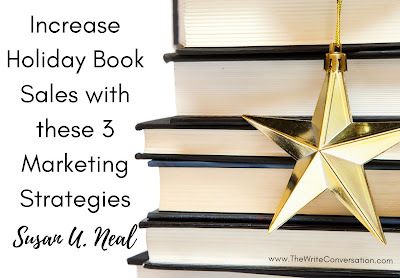
by Susan U. Neal RN, MBA, MHS @SusanNealYoga
Would you like to increase your book sales during the busiest book buying season of the year? Almost 25 percent of all annual book sales occur during the holiday season, and half of those purchases happen around Christmas. The following three techniques are simple and costs nothing except your time.
1. Schedule Holiday Book Signings
Bookstores love to host author events as it increases book sales and doesn’t cost the store anything except splitting the profit. I have three Barnes & Noble bookstores within 75 minutes of my home and a couple of others locally. Usually chain bookstores will only host an author event if your books are published in Ingram (usually IngramSpark). And your book should include a major discount (45–55 percent) and be returnable. If a book doesn’t sell, the bookstore wants to have the option to return it, or they may not order it in the first place.
Initially I stopped by each store, introduced myself to the manager, and gave them my book and one sheet. After that initial contact, I followed up with an email to the manager to schedule a live book event. Some bookstores order my books and have them at the store for me to use during the book signing; while other stores ask me to bring my own books.
Most bookstores are great about posting their local book events on social media. It boosts the attendance of the event if the author does the same. I’ve had some readers show up at my Destin Barnes & Noble book signing that I did not know. They saw my post on Facebook about the event. It is delightful to engage with readers who love your work and want to buy your next book.
To make the most of your book signings bring great pens, insert a bookmark and business card in each book, and hold a drawing for a free book so you get more traffic. Be sure to take pictures of the event, post on social media, and tag the bookstore.
Every fall, I call my three local bookstores within an hour’s drive to schedule my holiday book signing. From Black Friday to Christmas the bookstores are packed with shoppers. During my book signing last year, which was the Saturday before Christmas, I sold $500 worth of books. Buyers were desperate to find the perfect gift for their loved ones, and authors know exactly how their book would make the perfect gift.
2. Create Holiday Gift Bundles
As authors we need to produce loads of products to support our ministry financially. In addition to books, create digital products, courses, and coaching. You make more money on courses and coaching than you do your books. If you have a diversity of products, you can bundle them for packages.
In my website’s shop at https://susanuneal.com/shop , I’ve created a holiday bundle page where shoppers can find a variety of gift bundles. I’ve combined courses, books, digital products, DVDs, and electronic cookbooks to create a half a dozen gift bundles at a variety of prices. In October or November, I send this bundle link in an email to my subscribers. I always have a few who purchase my products for gifts. When I write holiday blogs, I include a link to my holiday shopping page.
3. Write Holiday Guest Blogs
Some of my highest viewed guest blogs have been about the best gift books to buy. For example, my blog, 21 Best Books to Gift During the Holiday and 12 Christ-Centered Children’s Books to Gift this Christmas , lists some of the best books you can purchase as presents. When creating these blogs, I’m sure to include some of my author friends’ books along with mine. Once the blog is posted, I contact the authors whose book is listed in the blog and ask them to promote the blog too. This cross promotion improves readership and book sales.
This holiday season, try these three techniques to increase your book sales. Schedule your holiday book signings at local bookstores. Create gift bundles in your website’s shop. And write holiday gift blogs that include your books.
TWEETABLEIncrease Holiday Book Sales with these 3 Marketing Strategies from @SusanNealYoga on @EdieMelson (Click to Tweet)
 Susan U. Neal, RN, MBA, MHS: Susan’s mission is to improve the health of the body of Christ. She has her RN and MBA degrees, as well as a master’s in health science. She is a CERTIFIED HEALTH AND WELLNESS COACHwith the American Association of Christian Counselors. She published five books, the Selah award winner 7 STEPS TO GET OFF SUGAR AND CARBOHYDRATES, CHRISTIAN STUDY GUIDE FOR 7 STEPS TO GET OFF SUGAR AND CARBOHYDRATES, HEALTHY LIVING JOURNAL, SCRIPTURE YOGAa #1 Amazon best-selling yoga book, and YOGA FOR BEGINNERSwhich ranked #3. She published two sets of Christian Yoga Card Decks and two Christian Yoga DVDs that are available at CHRISTINAYOGA.COM. Her digital product HOW TO PREVENT, IMPROVE, AND REVERSE ALZHEIMER’S AND DEMENTIA is a great resource. To learn more about Susan visit her website SUSANUNEAL.COM You can also connect with Susan on FACEBOOK, TWITTER, and INSTAGRAM.
Susan U. Neal, RN, MBA, MHS: Susan’s mission is to improve the health of the body of Christ. She has her RN and MBA degrees, as well as a master’s in health science. She is a CERTIFIED HEALTH AND WELLNESS COACHwith the American Association of Christian Counselors. She published five books, the Selah award winner 7 STEPS TO GET OFF SUGAR AND CARBOHYDRATES, CHRISTIAN STUDY GUIDE FOR 7 STEPS TO GET OFF SUGAR AND CARBOHYDRATES, HEALTHY LIVING JOURNAL, SCRIPTURE YOGAa #1 Amazon best-selling yoga book, and YOGA FOR BEGINNERSwhich ranked #3. She published two sets of Christian Yoga Card Decks and two Christian Yoga DVDs that are available at CHRISTINAYOGA.COM. Her digital product HOW TO PREVENT, IMPROVE, AND REVERSE ALZHEIMER’S AND DEMENTIA is a great resource. To learn more about Susan visit her website SUSANUNEAL.COM You can also connect with Susan on FACEBOOK, TWITTER, and INSTAGRAM.
Published on September 18, 2023 22:00
September 17, 2023
Use Your Online Events More Effectively Through These Promotion Ideas
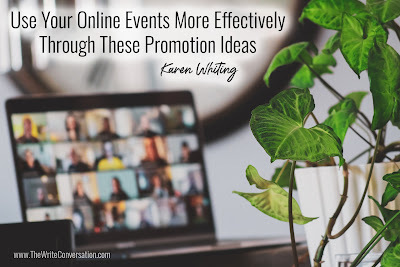
by Karen Whiting @KarenHWhiting
Since the early days of COVID many authors increased the amount of online speaking they do and also found it great for marketing their books. Prepare to use those opportunities for promotion.
Make Marketing Easy
For a live group event where you will be interviewed or leading a discussion, have any related books you wrote in reach. That makes it easy hold up while mentioning or reading from it. Make sure to hold it in front of the camera lens. If you have the e-book link you can get a universal link at Books2Read.com and use that.
It's also good to have a word document with a little introduction or little snippets about your books plus contact information that includes your web site's URL. You can copy and paste any information listeners might want into the chat instead of trying to type while talking. This can include talking points or tips you plan to share.
Engage the Audience
Choose a few good anecdotes to engage the audience. Make them relatable to your viewers as well as relevant to your books and brand. If you plan to mention great tips or steps to do something, have a handout prepared with a link for people to easily download.
Before the event, if it is public, share it in your social media. Encourage people to join in with a welcoming message and note about what you will cover. Add a photo of the book or a brief video.
Create Power Points
You can generally share the screen and use a PPT. This helps viewers follow along and they can take screen shots of the slides. Or you can download the slides as photos and include a link to them at the end of the presentation. Be sure some of the slides include your website, book title, and other promotional information.
Check the Connections
It's a good practice to be online ahead of time, especially with an interviewer. This way you can check your mic's volume, picture quality, screen share availability, and even you makeup before you click start.
Use Questions to Inspire Interaction
Be prepared for questions and ask for input. Craft questions that will stir imaginations or plug into memories people can share briefly. Ask people to describe in a nutshell or thirty seconds a related memory or a tip that works for them on the topic you're discussing. Have a few comments or anecdotes you can add to keep the question lively.
Leverage Gamification
People enjoy fun and games. Put a quick survey in the chat or see who can respond fast to a quiz type question. Or ask people to put in the chat a funny anecdote on your topic. You might even have a quick game with a prize.
Follow Up
Ask people to put in their emails and save the chat. That way you can send an email to the people who attended and thank them for coming plus invite them to subscribe to your email list, and give them your landing page link where they can subscribe for a free download.
Develop an additional follow up handout after the talk based on what inspired the most interaction. This can then include comments people made that show you listened and cared about the audience. That's also an opportunity for showing appreciation and letting people know what they put in the chat or said that made you smile, think, or impacted you in some way.
Repurpose
After the event consider what content engaged people and use that to create a new post, blog, or article. Or create a new tip sheet based on information that most excited the listeners. It might give you more ideas for future online talks to create.
It only takes minutes of preparation to promote while online!
TWEETABLEUse Your Online Events More Effectively Through These Promotion Ideas from @KarenHWhiting on @EdieMelson (Click to Tweet)
 Karen Whiting (WWW.KARENWHITING.COM) is an international speaker, former television host of Puppets on Parade, certified writing and marketing coach, and award-winning author of twenty-seven books for women, children, and families. Her newest book, The Gift of Bread: Recipes for the Heart and the Table reflects her passion for bread and growing up helping at her grandparent’s restaurant. Check out her newest book Growing a Mother’s Heart: Devotions of Faith, Hope, and Love from Mothers Past, Present, and Future. It's full of heartwarming and teary-eyed stories of moms.
Karen Whiting (WWW.KARENWHITING.COM) is an international speaker, former television host of Puppets on Parade, certified writing and marketing coach, and award-winning author of twenty-seven books for women, children, and families. Her newest book, The Gift of Bread: Recipes for the Heart and the Table reflects her passion for bread and growing up helping at her grandparent’s restaurant. Check out her newest book Growing a Mother’s Heart: Devotions of Faith, Hope, and Love from Mothers Past, Present, and Future. It's full of heartwarming and teary-eyed stories of moms.Karen has a heart to grow tomorrow’s wholesome families today. She has written more than eight hundred articles for more than sixty publications and loves to let creativity splash over the pages of what she writes. She writes for Crosswalk. Connect with Karen on Twitter @KarenHWhiting Pinterest KarenWhiting FB KarenHWhiting.
Featured Image: Photo by Sigmund on Unsplash
Published on September 17, 2023 22:00
September 16, 2023
Overcome Discouragement by Thinking Differently about Your Writing Journey
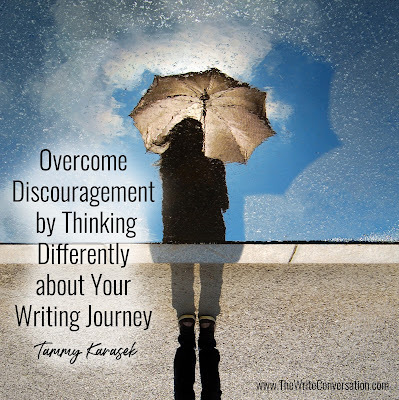
by Tammy Karasek @PickledPinkTam
We’re half-way through our writer’s conferences for this year. Whether we were able to attend or not, we hear about the successes of our fellow writers. Meanwhile, we may feel the heartbreak of rejection.
It doesn’t matter if we have attended a conference to pitch our book or submit a writing piece to a place online, we’d all agree that our desired outcome is to hear:
Oh yeah! This is the best story/article ever. We want this and will pay a million bucks as and advance! Who cares what your platform numbers are or if you even HAVE a platform. We’ve got to have this to publish!
I say that with tongue in cheek because I am, after all, a fiction writer like you, right? That scenario will not happen unless we write that into a book. (Grin)
But we can become overwhelmed with the comparison game if we allow it. How’d she get a contract, she just started writing—I’ve been writing for years? Why does he get every article published he submits?
Dangerous thoughts.
I propose we think differently about our writing and timelines. It may be safe to say you write because you felt God’s nudge to do so. If so, He’s equipped you with the talent of stringing words together to form understandable sentences. So keep doing it.
We need to continue to write the words God gives us to spread the gospel. We have no idea where He wants those words to land. We as Christ followers and writers have a great opportunity to write about Him to a person who may never pick up a Bible, but may pick up a book to read a good story. God has a plan for the words we will write. He wants us to walk in obedience and write the words he gives us—for this moment.
We might think, “But how will my words get out there if God isn’t giving me a book deal?” Could He want us to write the words He gave us and when He is ready, He’ll place them where He wants them? Who knows where God wants our words to land. If we don’t get offered a contract on our first pitch, should we throw in the towel and quit forever? I don’t think so.
God has a plan for the words we will write. He wants us to walk in obedience and write the words he gives us—for this moment.
If you or I are discouraged because we haven’t landed a book contract yet, let’s take a breath. What if we think differently about those No answers we get. Rather than taking that no and letting Satan roll that one word into things like: No, nobody will read this? No, you can’t write.
What if we change that?
Instead of NO, followed by a string of negativity with it, let’s change our thinking. When we hear NO, understand it as NO (COMMA) not yet.
No, not yet.
Doesn’t that seem a much better way to hear that No? This might not be the time, the agent or the publisher. But God’s time is always the perfect time, even if we don’t see it in the moment.
God has us right where we are. Let’s continue to learn and practice the craft. Attend a conference. Join a local writer’s group. Let’s be excited for each other as someone receives the desired yes from an agent or publisher. Someday it will be us and we’ll want to share our excitement with our fellow writers. Remember to rejoice when others rejoice.
Our time as writers will come.
Do you have a thought to share about how we can keep the discouragement of when we will have a turn at success from overwhelming our thoughts? Please share in the comments below.
TWEETABLEOvercome Discouragement by Thinking Differently about Your Writing Journey from author @TickledPinkTam on @EdieMelson (Click to Tweet)
 Tammy Karasek uses humor and wit to bring joy and hope to every aspect in life. Her past, filled with bullying and criticism from family, drives her passion to encourage and inspire others and give them The Reason to smile. She’s gone from down and defeated to living a “Tickled Pink” life as she believes there’s always a giggle wanting to come out! A writer of Romance—with a splash of sass. She’s also The Launch Team Geek helping authors launch their books and also a Virtual Assistant for several best-selling authors. She is now under contract for her book on Launch Teams due to release Fall 2023. Her work was also published in a Divine Moments Compilation Book—Cool-inary Moments. She’s also the Social Media Manager for the Blue Ridge Mountains Christian Writers Conference, Founding President and current Vice-President of ACFW Upstate SC, and Founding President of Word Weavers Upstate SC. She’s a writing team member for The Write Conversation Blog, Novel Academy, MBT Monday Devotions, The Write Editing and more. Connect with Tammy at HTTPS://WWW.TAMMYKARASEK.COM.
Tammy Karasek uses humor and wit to bring joy and hope to every aspect in life. Her past, filled with bullying and criticism from family, drives her passion to encourage and inspire others and give them The Reason to smile. She’s gone from down and defeated to living a “Tickled Pink” life as she believes there’s always a giggle wanting to come out! A writer of Romance—with a splash of sass. She’s also The Launch Team Geek helping authors launch their books and also a Virtual Assistant for several best-selling authors. She is now under contract for her book on Launch Teams due to release Fall 2023. Her work was also published in a Divine Moments Compilation Book—Cool-inary Moments. She’s also the Social Media Manager for the Blue Ridge Mountains Christian Writers Conference, Founding President and current Vice-President of ACFW Upstate SC, and Founding President of Word Weavers Upstate SC. She’s a writing team member for The Write Conversation Blog, Novel Academy, MBT Monday Devotions, The Write Editing and more. Connect with Tammy at HTTPS://WWW.TAMMYKARASEK.COM.Featured Image: Photo by David Marcu on Unsplash
Published on September 16, 2023 22:00
September 15, 2023
Thoughts on Why Book Covers Matter to Our Reading Audience
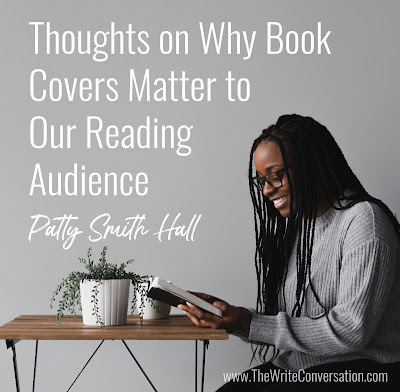
by Patty Smith Hall @PattySmithHall
My first month as an indie author was an active one, and I didn’t even publish a book. I took a five-day Amazon Ad challenge with Brian Cohen (he has another challenge coming up in April that I highly recommend,) started a website on WordPress, and edited some of my older books. So, out of all of this, what did I learn?
A good cover matters.
As I said earlier, I took The Five-Day Amazon Ad Challenge with Brian Cohen, and as part of it, I had to make several different types of ads—automatic and keyword—then watch how these ads performed over several days to see which were more productive. For this project, I selected Courting Doctor Clark, one of the books Harlequin gave me back when the Love Inspired Historical closed down.
I was excited to advertise this book. It was part of the Heartsong Presents division that LIH bought out, but never promoted. But as the days drew out, I was getting clicks but no sales. When I asked Brian about this, he asked me some pointed questions regarding my cover. Did my cover attract the kind of reader I wanted? Was it in line with my genre? If I saw my cover, would I want to buy the book?
 So, I went back and looked at my cover:
So, I went back and looked at my cover: Though I liked this cover, I’m not sure it appealed to my audience which is a thirty-five to forty-year-old woman who loves to read as an escape and enjoys history. It looked more like a regency that the American historical romance I wrote. If I was completely honest with myself, I probably wouldn’t buy it if I saw the cover alone.
After studying the one hundred best sellers in my genre, I contacted the new cover designer I’m working with, paged through her ready-art covers and found one that answered most of the questions Brian had asked me. It’s not the perfect cover, but in order to see if my Amazon ads, I needed to change it fast.
 Here’s the new cover:
Here’s the new cover: Within twenty-four hours, I saw a dramatic different in my sales and KU page read-throughs. I continued my ads through this month and to date, my sales/read-throughs have gone from the single digits to triple digit sales, a 3000 percent increase.
So, what did I learn? Covers matter, particularly when you’re using Amazon to distribute your book. Think about it—when someone types in ‘historical romance’ into Amazon’s search engine, they’re presented with a list of books. No blurbs or reviews, just covers.
Like I said, covers matter!
What do you find appealing in the covers of your favorite books? Do you buy a book because of the cover? Why?
TWEETABLEThoughts on Why Book Covers Matter to Our Reading Audience from @PattySmithHall on @EdieMelson (Click to Tweet)
 Patty Smith Hall is a multi-published author, teacher and encourager to new writersjust starting their journey. A founding member of ACFW, she served on the national board and as a Genesis contest coordinator, and presided as president of her local chapter. As an acquisition editor for Winged Publications, she finds great joy in helping and encouraging others reach their publishing dreams. Married almost 40 years to Danny, she finds great joy in her family, friends, and her relationship with Jesus Christ. You can contact her at www.pattysmithhall.com.
Patty Smith Hall is a multi-published author, teacher and encourager to new writersjust starting their journey. A founding member of ACFW, she served on the national board and as a Genesis contest coordinator, and presided as president of her local chapter. As an acquisition editor for Winged Publications, she finds great joy in helping and encouraging others reach their publishing dreams. Married almost 40 years to Danny, she finds great joy in her family, friends, and her relationship with Jesus Christ. You can contact her at www.pattysmithhall.com.Featured Image: Photo by Alexandra Fuller on Unsplash
Published on September 15, 2023 22:00
September 14, 2023
Six Reasons Writers Need Friends Who Are Writers

by Crystal Bowman
Last month I spent four wonderful and amazing days at the AWSA (Advanced Writers and Speakers Association) conference. I was reminded once again how important and rewarding it is to have friends and acquaintances who are also writers. Here are six good reasons why writers need friends who are writers:
Why Writers Need Writer Friends
#1 They understand the complex world of writing and publishing. When I tell nonwriters that I am an author, they respond with comments like, “Oh, what a fun job!” or “Must be nice to get those royalty checks!” or “What have you written?” Writers agree that writing is fun, but fun does not mean easy. I have spent days trying to revise one or two sentences. Writing, revising, and editing is tedious work. As far as royalty checks—a writer is never sure if it will be something substantial or not enough to buy a few groceries. And since there are billions of books out there, the chances of someone recognizing one of my titles is slim. Writers understand this!
#2 They spend many hours alone.Some writers are introverts who write from a cozy spot in their home, and some are extroverts who bring their laptops to a noisy coffee shop. But regardless of where writers write, they cocoon into their personal space and focus for hours on their project---alone. One time a mom asked if her 12-year-old daughter could job-shadow me for the summer. She said her daughter could do the “grunt work” that would allow me more time to write. The mom’s heart was in a good place, but she had no clue that writers write alone and there is no grunt work for a twelve-year-old girl. Writing is lonely—that’s why we need writer friends who get it.
#3 They critique each other’s work and give helpful feedback.Many writers belong to critique groups where they can share the stories they are working on and receive honest (and sometimes brutal) feedback to help them improve their stories. Asking a friend or relative who is not a writer to read your story may not be helpful because they don’t know what to look for. They will tell you it’s wonderful because they don’t want to offend you. They don’t understand that writers have thick skin.
#4 They rejoice together. On the last day of the AWSA conference, the Golden Scroll banquet was a time to award and recognize writers whose books and articles were selected by their peers to be works of excellence. When a writer’s name was called to receive an award, the audience clapped and cheered, even if their own books didn’t win. Why? Because writers know how hard it is to get published. They know how hard it is to market their books. And they know how hard it is to be recognized in a sea of published works.
#5 They comfort and encourage one another.I recently had a friend reach out to me in discouragement because the publishing company that published her picture book was going out of business and her book would soon go out of print. She was just getting started in her writing career and felt defeated. I told her how sorry I was and that I understood her feelings because I had a similar experience years ago. I gave her some tips on what to do next and tried to encourage her as best I could.
#6 They have their own language.The publishing industry has words that writers understand but often need to be explained when used with nonwriters such as: pub board, advance, work-for-hire, copy editing, substantive editing, developmental editing, indie publishing, hybrid publishing, acquisitions, and galleys. And then there are the abbreviations: fm, bm, ms, and arc—just to name a few. It’s nice to have conversations with other writers so we can freely use these terms without explaining them.
I consider it a privilege and honor to be a writer. I am humbled that God placed me in the world of publishing and has guided and blessed my writing journey for more than 30 years. And the friends I have made along the way are friends I will cherish forever—because we need each other!
Join the conversation—how do you benefit from having friends who are writers?
TWEETABLESix Reasons Writers Need Friends Who Are Writers from author Crystal Bowman on @EdieMelson (Click to Tweet)
 Crystal Bowman is an award-winning, bestselling author of more than 100 books for children and four nonfiction books for women. She also writes lyrics for children’s piano music and is a monthly contributor to Clubhouse Jr. Magazine. She loves going to schools to teach kids about poetry. She also speaks at MOPS (Mothers of Preschoolers) groups and teaches workshops at writers’ conferences. When she is not writing or speaking, she enjoys going for walks, working out at the gym, and eating ice cream. She and her husband live in Michigan and have seven huggable grandkids.
Crystal Bowman is an award-winning, bestselling author of more than 100 books for children and four nonfiction books for women. She also writes lyrics for children’s piano music and is a monthly contributor to Clubhouse Jr. Magazine. She loves going to schools to teach kids about poetry. She also speaks at MOPS (Mothers of Preschoolers) groups and teaches workshops at writers’ conferences. When she is not writing or speaking, she enjoys going for walks, working out at the gym, and eating ice cream. She and her husband live in Michigan and have seven huggable grandkids. WWW.CRYSTALBOWMAN.COMWWW.FACEBOOK.COM/CRYSTAL.BOWMANWWW.FACEBOOK.COM/CRYSTALJBOWMANWWW.INSTAGRAM.COM/CRYSTALBOWMANAUTHOR
Published on September 14, 2023 22:00
September 13, 2023
15 Tips to Encourage and Support Writer Friends

by Julie Lavender @JLavenderWrites
Is it my imagination, or does it seem like lots of books are launching all at the same time? Earlier this month, two of my fellow critique buddies from Page 33, my Word Weavers International critique group, released within a day of each other.
I’ve enjoyed serving on launch teams for many of my writer friends. As I’ve watched others’ launch teams and been in the trenches as my own books have launched, I’ve learned a lot. I’ve discovered the process is more than just helping friends publicize their books. It’s about encouraging these hardworking folks along the journey.
Supporting and encouraging our writer friends is biblical. While not specific to the writing world, these verses are especially appropriate:
* Therefore encourage one another and build one another up, just as you are doing. 1 Thessalonians 5:11
* Let no corrupting talk come out of your mouths, but only such as is good for building up, as fits the occasion, that it may give grace to those who hear. Ephesians 4:29
* And let us consider how to stir up one another to love and good works … Hebrews 10:24
In my next several posts, I’ll share some of the tricks and tips I’ve learned from others and through my own experiences to help you support your author friends. Here are a few to get you started:
15 Ways to Support Your Author Friends
1. Share authors’ books on social media. Be sure to share buy links, too. A picture always captures social media scrollers’ attention, so snap a picture of you holding the book to include with the post.
2. I think it’s fun to include a photo of myself with the author. I have a tendency to say on my social media posts, “My friend so-and-so just launched a new book …” Because I don’t want my social media followers to think I’m exaggerating my “friend” status, I dig into my photos from conferences or book signings to find a picture of me with the author.
Including the picture, along with a picture of me holding the book, makes the post more personal and helps my share seem more genuine and “believable.” (Perfect reason to take as many pictures at conferences as time allows—you never know when you’ll have the pleasure of sharing about a friend’s new release!)
3. Share friends’ latest blog posts. Hitting the share button within the author’s post is simple and oh-so-kind.
4. If you send out a newsletter, include something about your friend’s new releases or writing success.
5. Start a video series to share on social media and include authors.
Before I launched my book, 365 Ways to Love Your Child: Turning Little Moments into Lasting Memories, published by Revell, I started a campaign to collect brief videos—one to two minutes—from fellow authors. In them, they shared one way they show or have shown love to their kids or grandkids. They sent me the video, and I posted one per week for many weeks before the book launched. When I shared the video, I rarely discussed the launch of my book, but instead touted the other author’s books, blog posts, or articles. I grew an audience of moms and dads who wanted to find new ways to show love to their kids and simultaneously promoted my friends’ books or websites.
6. Snap pictures when you find friends’ books in a store and share them on your social media sites.
7. Share favorite lines from friends’ books on social media.
8. Join AWSA, CAN, and other Facebook groups. When members mention new book releases, make sure to share that information.
9. Host author friends on your podcast and give away a copy of their book.
10. Invite author friends to guest blog on your website and include a book giveaway.
11. If an author friend mentions they’ll be traveling to or through your town, offer to treat them to lunch or dinner. Be sure to snap photos and add those to your social media sites.
12. Tell a conference director you enjoyed an author’s class. Even if the conference doesn’t ask you to fill out a survey, message or email the conference director and share the wonderfulness of that author friend. This helps them make decisions about staff and faculty for future events, which in turn supports the writer’s new projects and writing opportunities.
13. Take your favorite author’s book with you to doctor and dental appointments. Tell someone there about the book. You could even share the book with them as a gift.
14. Boast to your family and friends about a favorite author.
15. Comment on author’s social media posts. These extra comments help the algorithms of the post, which will allow more people to view the post.
Supporting author friends by purchasing their books is just the beginning of the encouragement journey. Try some of the tips and suggestions above to show some love to an author friend. Next month, I’ll share more tips. Leave your best suggestions below to help us continue to learn from each other how to support fellow authors.
TWEETABLE15 Tips to Encourage and Support Writer Friends from @JLavenderWrites on @EdieMelson (Click to Tweet)
 Julie Lavender loves supporting and encouraging author friends. She’s always thrilled, honored, and humbled when fellow writer friends care for her along the publication path. Julie’s excited that her next book with Penguin Random House, Strength for All Seasons: A Mom’s Devotional of Powerful Verses and Prayers, releases in November. She’s thrilled that her previous PRH book, Children’s Bible Stories for Bedtime, is releasing as a bilingual version in December. And she’s super-excited that two picture books come out in 2024 and 2025 from End Game Press and Wren & Bear Books.
Julie Lavender loves supporting and encouraging author friends. She’s always thrilled, honored, and humbled when fellow writer friends care for her along the publication path. Julie’s excited that her next book with Penguin Random House, Strength for All Seasons: A Mom’s Devotional of Powerful Verses and Prayers, releases in November. She’s thrilled that her previous PRH book, Children’s Bible Stories for Bedtime, is releasing as a bilingual version in December. And she’s super-excited that two picture books come out in 2024 and 2025 from End Game Press and Wren & Bear Books.Featured Image: Photo by Helena Lopes on Unsplash
Published on September 13, 2023 22:00
September 12, 2023
Article Writing Basics to Help You Get Started
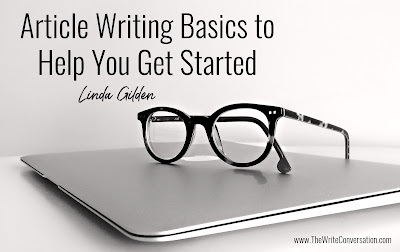
by Linda Gilden @LindaGilden
People are often surprised when I say I love to write articles. “Articles?” they say. “How did you learn to do that? Doesn’t that take a lot of time? How do you know what to write?”
I almost don’t know how to respond to that. Why wouldn’t you want to write articles? Articles are fun. Articles are short. Articles are a great way to make a little extra money while building your platform, establishing yourself as an expert in a field, and marketing your newest book.
7 Things to Know Before You Begin Writing Articles 1. Ideas are everywhere! Begin to keep an idea journal. Jot down ideas as they come to you with just enough notes to remind yourself what your thoughts were.2. Almost every publication has guidelines (many on their websites) that can tell you what you need to know about writing for their magazine. Themes, word count, special departments and more are available for you if you will read the guidelines. Guidelines are not the same for every magazine so be sure to read ones for the specific magazine you are targeting. Market guides are an abbreviated way to acquaint yourself with the needs of many magazines.3. Make sure you know proper article format. What style book does the magazine adhere to? If it is a faith-based publication, what version of the Bible do they prefer?4. Just because articles are short and require many less words than a book doesn’t mean you shouldn’t choose every word carefully. Actually, you have less of your reader’s time so you want to make sure you communicate your point clearly and accurately.5. Articles can be slanted in different ways so you can repurpose your material. Don’t throw out words you don’t think you need. Save them to include in a later version of the article.6. Writing articles gives you a solid way to build “clips” that will help you create your portfolio. This will give you a good sampling of your work that you can share with new editors as they explore whether or not your writing is a good fit for their publications.7. Articles connect you to many different sources. Keep good records of your research and any interviews you do. Make notes of new ideas that come to mind as your write articles so you will have your next project firmly in your mind.
Once you complete an article and hit the send button, don’t constantly check your email for a response. Begin writing your next article and searching for the publication that is the best fit. Keep the article writing ball rolling and pretty soon you will see the checks and credits ball rolling as well.
TWEETABLEArticle Writing Basics to Help You Get Started from @LindaGilden on @EdieMelson (Click to Tweet)
 Linda Gilden is an award-winning writer, speaker, editor, certified writing and speaking coach, and personality consultant. Her passion is helping others discover the joy of writing. Linda’s book, Articles, Articles, Articles! can give you more information about articles. She is the author of over two thousand magazine articles and 35 books including the new LINKED Quick Guides for Personalities series. As Director of the Carolina Christian Writers Conference, Linda helps many writers take the next step in reaching their writing goals. Linda’s favorite activity (other than eating folded potato chips) is floating in a pool with a good book surrounded by splashing grandchildren—a great source of writing material! www.lindagilden.com
Linda Gilden is an award-winning writer, speaker, editor, certified writing and speaking coach, and personality consultant. Her passion is helping others discover the joy of writing. Linda’s book, Articles, Articles, Articles! can give you more information about articles. She is the author of over two thousand magazine articles and 35 books including the new LINKED Quick Guides for Personalities series. As Director of the Carolina Christian Writers Conference, Linda helps many writers take the next step in reaching their writing goals. Linda’s favorite activity (other than eating folded potato chips) is floating in a pool with a good book surrounded by splashing grandchildren—a great source of writing material! www.lindagilden.com
Published on September 12, 2023 22:00
September 11, 2023
Are You Discouraged with Your Writing Dream? Don't Despair, 4 Tips to Keep You on Track

by Cindy K. Sproles @CindyDevoted
It happens all the time. New writers enter their first conference "stary-eyed." In fact, I love to see the stars because what that tells me is these writers have dreams, and to be a good writer; one must have dreams.
Six months after the conference, those same stary-eyed writers become disillusioned. Their dreams are gone, and they're floundering in search of the goals they were so sure of months earlier. I wish I could tell you, well before your first conference, what happens to your dreams, but I don't get that privilege until I see you at the conference, and then, every one of you doesn't attend my classes. Nor, in the thick of excitement at the conference, do you really wear your listening ears. What's a momma hen author to do?
In these four items, you must understand that as a new writer, these are things you must learn. You don't just come into the industry knowing these things. But the key here is to listen and not lose your dreams. Hold tight to them, and put your goals in the proper order.
4 Things That Can Discourage Unsuspecting New Writers
1. Publication-ready: Most new writers slave over their work bringing it to their idea of perfection. When they attend a conference, their excitement and determination to be published blinds them to the fact that their first works may not be publication-ready. Agents, editors, and publishers are looking for polished work to represent. Few are in search of an idea. Instead, they want work that has been through the wringer and back. In other words, work free of plot issues, point of view slips, overwriting, and long drawn-out descriptions that slow a story down. They need clear thoughts, strong writing, and stories with a beginning, middle, and end (don't laugh, sometimes, we find writers who never get past the beginning. It's easy to do.)
Publication ready means a critiqued work where the flaws are scrubbed as best as possible, and the story flows from beginning to end without major errors that stop a reader or cause them to question. Don't panic! This work takes practice. You don't just wake up one morning and have a polished manuscript, be it fiction or non-fiction. It takes work and guidance.
2. Agent-itis: There is a misconception among new writers and some seasoned conferees that your goal at your first conference is to pick up an agent. The truth is, an agent can't sell 1) work that isn't written or 2) work that is not publication-ready. As new writers, we aren't sure of an agent's job. The misconception comes when we think the agent is there to caudle us along. Though some agents are wonderful to help by doing some minor edits, most wait for you to send polished, well-written work so they can begin to shop and sell it. An agent is not your critique partner or your editor. Their job is to encourage you, take your work and sell it, negotiate a contract, and serve as a mediator between you and the publisher. They work on your behalf to care for you through the publishing process.
New writers, not by any fault of their own, do not know the process. They must learn—hence, why we attend conferences so that we can learn how, when, and what to do to gain an agent.
3. Refusal to only think BOOK: Many dreams crash and burn because new writers only see the trophy of a book as the reward. They tend to look past those things that are obvious stepping stones—things like magazine articles, anthologies, and website writing. Not only can you earn money writing in these areas, but they are also amazing learning venues and networking spots. Write an article for a magazine and reach 200,000 readers. Write a book and gain 500. Hummm. Weigh that out. My point is, don't shut your eyes to these options. There's nothing more rewarding than the success of a magazine article.
4. Rejection: Nothing shoots down our dreams faster than rejection. No one likes to be told no. It takes us back to our youth when mom said, "No, don't do that," a thousand times. It's important to understand that rejection in the publishing world is different. When a publisher says no, it is not because we aren't allowed to do something. It's because of one of the following: 1) the work is not publication-ready, 2) they already have a full shelf of titles and don't need any more for the time 3) there is no place on their shelf for another book similar to one they already have.
So when you are told no, don't hang your head disappointed. Chin up, all these things can be fixed by hard work or simply waiting. I know, the dreaded W word. Wait.
These four things will quickly pop the dream bubble of a new writer. If you know the process and what to expect, then you set proper expectations, leading to a determined writer willing to learn and put in the work necessary to gain a yes. Your mindset is essential. It's vital.
Less than .01% of new writers gain a contract during their first conference, so come prepared to learn at your next conference. Understand that, like any profession; there is a learning curve. Writers must learn the publishing process and learn the craft of writing. It's a give-and-take sort of thing. Give the effort, and an agent, editor, or publisher will eventually take the work.
When you see a well-published author, know they have walked this path too. They weren't published overnight. They had to learn the craft, experience the rejection, and climb the ladder to success. Well-seasoned writers have, what I call, bloody knees, meaning they've been there and experienced the ups and downs. Nothing just falls in your lap. It all takes work.
Set your dreams on becoming published but put your expectations in the proper order. You’ll soon find yourself climbing the publishing ladder of success.
TWEETABLEAre You Discouraged with Your Writing Dream? Don't Despair, 4 Tips to Keep You on Track @CindyDevoted on @EdieMelson (Click to Tweet)
 Cindy K. Sproles is an author, speaker, and conference teacher. Having served for a number of years as a managing editor for Lighthouse Publishing of the Carolinas and Ironstream Media, Cindy now works as a mentor, coach, and freelance editor. She is the co-founder of Writing Right Author Mentoring Services with Lori Marett and she is the director of the Asheville Christian Writers Conference. Cindy is also the co-founder of Christian Devotions Ministries and WWW.CHRISTIANDEVOTIONS.US, as well as WWW.INSPIREAFIRE.COM. Her devotions are in newspapers and magazines nationwide, and her novels have become award-winning best-selling works. She is a popular speaker at conferences and a natural encourager. Cindy is a mountain girl, born and raised in the Appalachian mountains, where she and her husband still reside. She has raised four sons and now resorts to raising chickens where the pecking order is easier to manage. You can visit Cindy at WWW.CINDYSPROLES.COM or www.wramsforwriters.com.
Cindy K. Sproles is an author, speaker, and conference teacher. Having served for a number of years as a managing editor for Lighthouse Publishing of the Carolinas and Ironstream Media, Cindy now works as a mentor, coach, and freelance editor. She is the co-founder of Writing Right Author Mentoring Services with Lori Marett and she is the director of the Asheville Christian Writers Conference. Cindy is also the co-founder of Christian Devotions Ministries and WWW.CHRISTIANDEVOTIONS.US, as well as WWW.INSPIREAFIRE.COM. Her devotions are in newspapers and magazines nationwide, and her novels have become award-winning best-selling works. She is a popular speaker at conferences and a natural encourager. Cindy is a mountain girl, born and raised in the Appalachian mountains, where she and her husband still reside. She has raised four sons and now resorts to raising chickens where the pecking order is easier to manage. You can visit Cindy at WWW.CINDYSPROLES.COM or www.wramsforwriters.com.
Published on September 11, 2023 22:00
September 10, 2023
Don't Give Up On Your Writing Before You Begin

by Larry J. Leech II @LarryJLeechII
Back in the 1970s, Steve Martin, that wild and crazy guy, uttered some famous words on an album (yeah, those things made of vinyl) that I have never forgotten: “Punt on first down.”
Those who understand football know that is just plain old crazy talk. No team in its right mind would punt on first down. That’s just giving up without trying. Quitting without any effort. And it this also applies to writers.
Yeah.
Kinda like we feel sometimes while working on a project. Grab a towel and throw it in. Curl into a ball and cry until eternity.
But if we writers succumb to the urge to quit every time, we’d never finish a product. And we readers wouldn’t have any books or articles to read.
If that happened, I guess we’d all have to binge-watch shows on our favorite streaming platform. And then, we’d all … oh man, let’s not go fall into that abyss.
Let’s assume that we can, and ultimately do, overcome the desire to “punt on first down,” “throw in the towel,” or cry until the cows come home.
Whenever I get stuck, I ask a few questions: Why have I taken on this project? For me? For public consumption? To push the limit on my ability? To bring glory to our heavenly Father?
Oh, that last one. The real reason. The “write” reason. With Him, punting on first down is not an option. Unless, of course, the reason does not line up with His will. In that case, punt on first down, second down, third down. Even if the reason is His will, the process won’t always be easy.
The antag in our life story will do whatever he can to derail, distract, or discourage us. Make us want to punt on first down.
Life’s greatest opportunities and accomplishments don’t always come wrapped in a big box with a giant bow on top. Would be nice, wouldn’t it?
Sometimes we must push through the mud and muck of life to wrap up a project or finish an article or to say anything worthwhile in a blog. Punting on first down at the first sign of trouble would be much easier. But finding the inner strength, the drive, the commitment to finish is always worth it. Few accomplishments feel as good as writing…
TWEETABLEDon't Give Up On Your Writing Before You Begin from @LarryJLeechII on @EdieMelson (Click to Tweet)
 Editor-in-Chief at Bold Vision Books and writing coach of award-winning authors, Larry J. Leech II has spent more than forty years writing and editing. He started his career as a sportswriter in southwestern Pennsylvania where he covered prep, college, and pro sports, including the Pittsburgh Pirates and Steelers.
Editor-in-Chief at Bold Vision Books and writing coach of award-winning authors, Larry J. Leech II has spent more than forty years writing and editing. He started his career as a sportswriter in southwestern Pennsylvania where he covered prep, college, and pro sports, including the Pittsburgh Pirates and Steelers. In 2004, after 2,300 published articles, Larry moved into the book publishing industry. Since that time, he has ghostwritten 30 books, edited more than 400 manuscripts, and coached hundreds of authors through the writing and publication process. You can find him online on Twitter, Facebook, and Instagram.
Published on September 10, 2023 22:00



